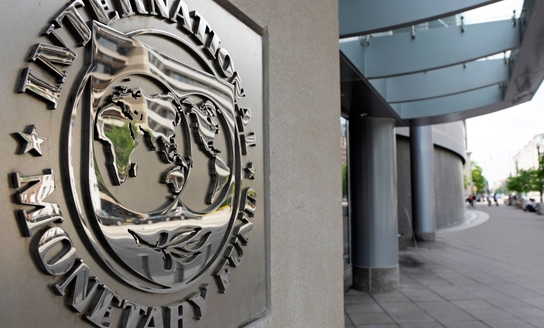
Amid the commotion surrounding Egypt's presidential elections and the drafting of a new constitution, the Muslim Brotherhood has taken its battle with the military-appointed government on to the economy.
Presidential candidate and millionaire businessman Khairat al-Shater focused his first major media interview since submitting his candidacy papers on his plans for the economy, and stated in no uncertain terms his position on the yearlong negotiated US$3.2 billion International Monetary Fund loan.
"We told [the government] you have two choices. Either postpone this issue of borrowing and come up with any other way of dealing with it without our approval, or speed up the formation of a government," he told Reuters in an interview on Sunday.
The IMF has placed political consensus as a condition to disbursing the loan, and the deal's finalization has been contingent on the acceptance of the Brotherhood's political arm, the Freedom and Justice Party, the party with the most seats in Parliament.
Meanwhile, in a statement released Wednesday, the IMF said it had met with relevant members of Parliament and the government and found that there was a “shared understanding on the need to address short-term challenges facing the economy.” Short-term challenges include fast-declining foreign reserves, a looming currency devaluation and a massive budget deficit.
Such a clear and public statement on the loan from a senior Brotherhood member is part of the ongoing dispute between the Islamist movement and the military regime, which includes the government of Prime Minister Kamal al-Ganzouri, analysts say.
"It is propaganda that they are trying to use in confrontation with the government," said Ashraf El Sherif, an expert on Egypt's Islamist movements.
Given that the FJP is not ideologically opposed to the IMF — as it has repeatedly stated an acceptance of the loan in principle — Sherif believes the timing of Shater's rhetoric is related to the presidential race and the portrait the regime is trying to build against him as a businessman and a part of the crony capitalism of the former regime.
"It is political propaganda against the regime's character assassination of Shater as a businessman and continuation of Gamal Mubarak. He wants to establish a counter-propaganda of economic self-sufficiency and national development for political purposes," Sherif added, likening the Brotherhood leader to the businessman son of the deposed former president who many believed was being groomed for office.
The announcement of former Vice President Omar Suleiman's candidacy is also a factor behind Shater's statements on the loan, Sherif said. Suleiman, who served as intelligence chief before briefly being appointed Mubarak’s deputy during the revolution, has taken an aggressive stance against the Brotherhood, saying it lacks experience. He is trying to portray himself as a statesman, and "this is him saying I can make my own decisions and be critical."
The FJP has been trying for weeks to push forward a vote of no confidence against the government through Parliament. At the same time, the party has said it cannot accept the loan given the government's lack of transparency on the budgetary requirements, how it plans to spend the loan and how it will pay it back, especially since it will soon be replaced if the Supreme Council of the Armed Forces hands over power as it has promised by the end of June.
The FJP has also rejected the economic reform plan the government put forward to the IMF, which is based on austerity measures, and which the party says is too vague.
While the FJP has played the rejection card, the government has been playing a misinformation game. On 4 April, the State Information Service released a statement saying the loan had been accepted after a series of meetings between People's Assembly members and ministers as "MPs showed comprehension of the economic conditions Egypt is currently undergoing."
But this was highly unlikely, given that most senior FJP members were abroad at the time, conducting their first official delegations to countries such as the US, China, the UK and Uganda. The People's Assembly did not meet for this reason, and when People's Assembly Speaker Saad al-Katatny returned on 3 April, a session was held late the following day to discuss a crisis in the Constituent Assembly.
Khaled al-Qazaz, the FJP’s foreign relations coordinator who was with the Washington DC delegation, told Egypt Independent he had "not been aware of the SIS statement" and that IMF regional director Masood Ahmed — who has been leading negotiations on the loan — was also in Washington DC. Nevertheless, an IMF delegation remained in Egypt until Wednesday to continue negotiations over the loan, according to the IMF statement.
Since it was first mentioned following former President Hosni Mubarak's handover of power to SCAF, the IMF loan has been politically unpopular.
Critics say taking money from the fund makes the country beholden to Western interests. They also say it is a return of former President Hosni Mubarak and his government’s policies of working closely with US-based international lending institutions the IMF and World Bank in setting economic policy rather than seeking popular consensus.
Under Mubarak, many argue that Egypt pursued economic growth and development projects, while the country’s impoverished stayed poor or grew poorer.
The Ganzouri-led government's plan, which has been approved by the IMF, is based on severe austerity measures at a time when the revolution's social justice demands include the creation of more jobs and spending on healthcare and education.
“The IMF mission will remain in close contact with the authorities in the coming weeks as they finalize remaining details of their economic program, including the 2012/13 budget, and mobilize the required political support for this program,” the IMF statement on Wednesday said.
Though not officially released to the public, representatives from Popular Campaign to Drop Egypt’s Debt were made privy to the government plan and leaked it.
Following a meeting with FJP MP Saad al-Hosseiny, head of the People's Assembly Budget and Planning Committee, the group released a critical statement saying the "so-called 'reform' program" was focused on lessening the budget deficit and not on creating jobs.
The group called on the FJP and other parties to reject the plan, and "exchange it with another that is based upon channeling the resources of this loan to increase public spending on high employment projects in the fields of education, health, housing and public transportation."
The plan includes amendments to Egypt's income taxes, the possibility of introducing an across-the-board sales tax, raising the rent on agricultural lands, and lifting Egypt's long policy of subsidizing energy, gasoline and gas.
The IMF has its own conditions for granting the loan but has not made them public. In January, Egypt Independent’s sister Arabic newspaper Al-Masry Al-Youm published a leaked document with the alleged list of 14 IMF conditions. These included the fund monitoring Egypt's economic performance and payments, and the implementation of a value-added tax and higher customs fees. Both the IMF and the Egyptian Finance Ministry later said the document was false.
But conditions that require greater privatization, deregulation and more open market practices have been a concern for many since the loan was first offered.
Due to a lack of transparency around the deal, it's hard to know the details of the policies or how the government will actually go about their implementation.
The IMF has been tight-lipped on the matter, but some of the institution's publications shed some light on what the reforms could mean for Egypt. Ahmed certainly seems to think that doing away with subsidies is a priority.
In a May 2011 blog post, he wrote that Middle Eastern countries could no longer rely on keeping bread and commodities cheap to appease a restless population.
"Like many things, there may be a time and a place for using subsidies," he said. "But, they need to be better targeted. And, often, there will be better alternatives. Alternatives that do a better job of protecting the poor."
Despite criticism surrounding the loan, the IMF deal is also largely billed as the country's best and last hope to help balance a growing budget deficit and alleviate a currency crisis, as well as a green light for other aid and foreign investment to start flowing into Egypt.
Receiving the IMF loan, the argument goes, would be a vote of confidence in Egypt's fiscal responsibility and agreement on an economic vision that investors are looking for, particularly those in the Gulf States that promised large amounts of funding for Arab Spring countries but have so far failed to deliver.
In a February opinion piece published by Egypt Independent, commentator Sultan al-Qassemi said that UAE Foreign Minister Sheikh Abdullah bin Zayed told him "the Gulf states would gladly commit to further investments if the Egyptian government adopts a clear developmental plan and position with regard to Egypt's IMF and World Bank commitments — instead of playing hard to get."
Qazaz said FJP members are aware of this and have been briefed that the loan is a prerequisite for foreign investment.
"The loan is a guarantee for foreign investors to come and support the Egyptian market, and will provide the necessary liquidity in the short-term," he said.
"The amount of debt is not that big; assurances to the international community will be bigger," he added.


